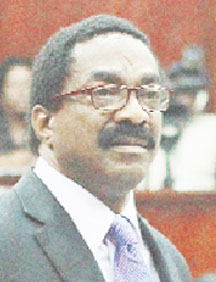The work of the Special Select Committee reviewing proposed local government reform legislation is progressing steadily despite disagreements, according to members, including Chairman Basil Williams, who say they are currently considering the third of the four bills they have been mandated to examine.
The Special Select Committee was mandated to review four bills deemed instrumental for local government reform and the holding of long-delayed local government elections: the Local Government Commission Bill, the Fiscal Transfers Bill, the Local Government (Amendment) Bill and the Municipal and District Councils (Amendment) Bill.
Williams told Stabroek News that currently the committee’s work has been placed on the back burner to facilitate the budget debate, which is scheduled to begin today. He, however, said that the meetings have gained traction and the committee is making progress. At the time the budget was presented, the committee was considering the details of the third bill, he pointed out, though he noted that there are still clauses, in the two bills that have already been scrutinised as well as in the one currently before the committee, that have been “parked” for subsequent re-examination.

In relation to the Fiscal Transfers Bill, Williams explained that the bill lacked formula to achieve the prescribed results. As a result, he said, two experts were engaged and they both proposed a formula for consideration. If accepted, this formula would apply to all Neighbourrhood Democratic Councils (NDC) and Municipalities, with the exception of Georgetown, owing to its extremely large population.
Another bill of contention, according to Williams, is the Local Government (Amendment) Bill. He said that the government members of the committee have proposed the implementation of an office of the Regional Executive Officer (REO) in every NDC, a move which is being opposed by the combined opposition. Williams argued that the whole idea of the reform is to coin legislation which will give people in the communities more autonomy. If the opposition’s proposals succeed, the Local Government Minister would be required to cede several of the functions currently carried out to local governing organs.
Presidential Advisor on Governance Gail Teixeira and Local Government Minister Ganga Persaud agreed that the work of the committee is progressing despite several unresolved issues. Teixeira, like Williams, said that while the majority of the issues in the bills examined so far have been resolved, there are one or two major elements that would have to be revisited. Persaud said that the meetings are moving apace, since they are not allowing contentious issues to derail the business of the committee.
“The committee has adopted the attitude of moving past the difficult, contentious issues, which well be re-examined and smoothed out once the simpler issues are dealt with,” said Persaud. (Chevy Devonish)





